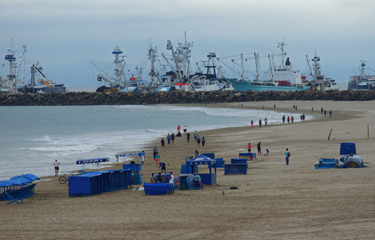The European Commission has confirmed that it has issued the Republic of Ecuador with a so-called “yellow card” and has informed the South American country that it needs to step up its actions in the fight against illegal, unreported, and unregulated (IUU) fishing.
Its decision, officially made on 30 October, is based on identified shortcomings about the country's ability to comply with agreed standards under international law of the sea as a flag, port, and market state.
The E.C. said Ecuador is encouraged to step up its actions to ensure that fish entering its market do not stem from IUU fishing. In particular, it should develop an enforcement and sanctioning system to address IUU fishing activities. Moreover, an adequate control of the activity of processing plants – especially those exporting to the E.U. – is paramount.
The E.C. has also identified limitations in the fisheries’ legal framework.
“Ecuador is a major trade partner for fishery products. We have a huge responsibility towards the E.U. consumers to make sure that the imports from this country only stem from legal fishing activities,” E.U. Commissioner for Environment, Maritime Affairs and Fisheries Karmenu Vella said. “The European Commission has detected shortcomings that hinder the capacity of Ecuador to provide this assurance. We invite the Ecuadorian authorities to step up their efforts and implement the necessary reforms to fight against IUU fishing. We stand ready to work closely with Ecuador to tackle the identified issues and raise the standards of fisheries management.”
The yellow card does not affect trade between the E.U. and Ecuador, but rather acts as a warning that the E.U. is considering further action, most notably a red card, which would result in a ban of Ecuadorian seafood products from entering the E.U. market.
In particular the E.C. listed the following items as issues contributing to yellow card decision:
- Ecuador’s legal framework in place is outdated and not in line with the international and regional rules applying to the conservation and management of fishing resources.
- Law enforcement is hampered by this outdated legal framework, inefficient administrative procedures, and a lenient approach towards infringements. As a result, the sanctioning system is neither depriving the offenders from the benefits accruing from IUU fishing, nor deterrent.
- There are serious deficiencies in terms of control, notably over the activity of the tuna fishing and processing industries.
- These deficiencies undermine the reliability of the traceability system upon which the certification of the legality of the catches is based.
The European Commision said it conduct its next evaluation of Ecuador in six months, when it will measure the country’s efforts in progress in addressing the identified shortcomings.
Photo courtesy of Alejo Miranda/Shutterstock







